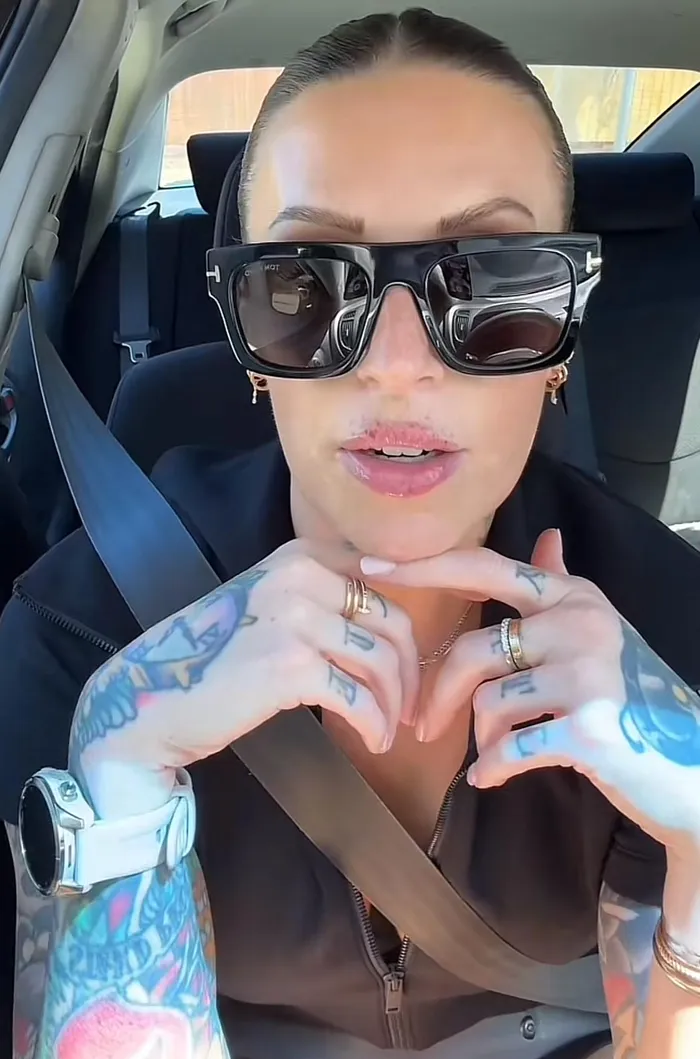
Social media influencer Alexa Locke admits to hating every single tattoo she's ever gotten.
Image: TikTok
There’s a saying that tattoos are a map of who you once were. But what happens when that story no longer fits who you are?
Alexa Locke, a social media influencer who started getting tattooed at 18, in a now viral TikTok video, admits: “I hate my tattoos … I personally regret every single tattoo I’ve ever gotten … If I had the opportunity and the money, I would completely remove every single tattoo on my body.”
“I wish someone had told me to wait.”
Locke has gone viral for tackling a topic that’s often whispered about, yet rarely said out loud: tattoo regret. And the internet can’t stop talking about it.
She’s not alone, but she’s also not without critics. Locke’s honesty struck a chord, drawing thousands of comments, from full support to complete disagreement.
Some people praised her vulnerability; others pushed back, calling tattoos “part of who I am”. And some asked a bigger question: Why do so many women seem to regret being heavily tattooed, while men rarely say the same?

A 2021 survey by Ipsos revealed that nearly one in four individuals with tattoos regretted at least one of them.
Image: Alexa Locke/TikTok
Tattoos are celebrated as art, rebellion, and personal storytelling; hearing someone openly admit to regret feels almost taboo.
But Locke’s honesty has opened a floodgate of opinions, and it’s making many of us rethink what ink means, how it feels to live with it and what happens when the love fades.
Why do some people regret their tattoos?
Locke’s video, reshared with over a million users, dives deep into why she feels the way she does. For her tattoos were part of an identity crisis she had as a teenager: “I wanted to be loved, to be accepted … I’m not the same person I was 20 years ago.”
One social media user commenter summed up the fear many people feel before getting inked: “Tattoos are a permanent reminder of a temporary mindset.”
While another simply wrote: “Tattoo regret is so real!”
Research supports her experience. According to a 2021 survey by Ipsos, nearly one in four people with tattoos regret at least one of them.
And a 2018 study in the Journal of Clinical and Aesthetic Dermatology found that the most common reasons for regret include impulsive decisions, changing personal beliefs, and tattoos that don’t age well with lifestyle or career choices.
Most regrets are tied to tattoos that were impulsive or symbolic of a past relationship or life phase.
The other side of the story: tattoos as living memories
Yet, the comments under Locke’s video show how deeply personal this topic is. For every regret story, there’s someone who sees tattoos as precious reminders of their life journey.
@Danelle shared: “I’m 36 and started getting tattoos at 18 … every tattoo is a stage in my life … I will love mine forever.”
Similarly, @Brianna Hile posted: “As someone who is heavily tattooed, I have never regretted a single one … They’re a huge part of me & tell a story of my life.”
It’s a sentiment echoed by many, “Tattoos can be deeply meaningful and empowering, especially when they’re chosen thoughtfully and reflect significant moments or values.”
Social media, beauty standards and shifting tastes
Why are more people suddenly talking about regret?
It’s a question worth asking. In a piece with Allure, tattoo artist Mira Mariah suggested women often face harsher judgements: “Women are told to look soft, clean, and feminine. Tattoos challenge that, and some women internalise this over time.”
The rise of the “clean girl aesthetic” on social media, bare skin and minimal make-up, might also play a part. As trends shift, tattoos that once felt empowering can suddenly feel at odds with new ideals of beauty.
Some commenters believe social media trends like the “clean girl aesthetic”, which often celebrates bare, minimalistic beauty, have pushed heavily tattooed people to reconsider.
The practical side: careers, kids and covering up
Beyond beauty, there’s a practical reality: tattoos can affect job prospects and how others see you. Blaire Allison, another TikTok user, weighed in on a viral story of a woman who believed she wasn’t hired at a retail store because of visible tattoos:
“We have freedom to get tattoos,” Allison said, but we’re not free of the consequences." Some choose placements carefully to avoid these dilemmas. My husband stopped his sleeve just above the arm so he could wear a shirt for interviews. It’s not right that people judge, but it happens.”
Even tattoo artists often advise waiting on visible areas like the hands, face or neck. “Think about your future self, it’s easier to add later than to remove.”
She added, “You can say that’s unfair, but we have to be aware that society still judges certain choices.”
While tattoos are increasingly accepted, a 2022 study by the Journal of Social Psychology confirmed that people with highly visible tattoos can still face bias in professional settings, especially in customer-facing roles.
Locke also stated she’d remove everything if she could: “As soon as I hit a million followers … I’ll be getting a full body tattoo removal.”
Tattoos are permanent. But people and what we love change.
Whether you’re inked head to toe or thinking about your first tiny design, remember, tattoos might age beautifully with you, or they might become reminders of who you once were. Either way, it's your story, your skin and your choice.
Related Topics: